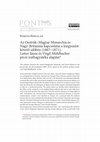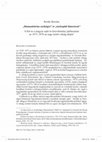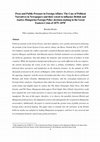Papers by Bertalan Bordás

Pontes, 2024
In the politically turbulent period of the late 1860s, when the Austro-Hungarian Empire was emerg... more In the politically turbulent period of the late 1860s, when the Austro-Hungarian Empire was emerging from a Prussian-Austrian war, Foreign Policy Decision-makers of the state were desperate for allies. Between 1867 and 1871, the Monarchy was exhausted militarily, economically, and socially, and seemed incapable of exercising modest power display, as it was just beginning to rebuild aft er the defeat at Sadowa. Almost as a matter of course at this time, the Monarchy was looking for an alliance with another empire, and Britain happened to look for a continental partner. Th e island nation was initially rather disinterested in the aff airs of the continent, as the English liberal political elite had to deal with issues such as the Irish question, the American Civil War and the extension of voting rights in 1867. Nonetheless, the renewed Austro-Hungarian state attracted attention as Austria’s transformation created a new situation in Europe. On a personal level, the relations between the two states included the subordinates of the Austrian Chancellor and Foreign Minister Friedrich Ferdinand von Beust: the Hungarian-born Count Rudolf Apponyi (II), who represented Austria-Hungary as ambassador in London until his dismissal in 1871, and the later Foreign Minister, Count Gusztáv Kálnoky.Th e foreign policy-related archival material of the Haus-, Hof- und Staatsarchiv (HHStA) of the Austro-Hungarian Monarchy and the foreign relations of the second half of the century were the subject of many national and foreign authors. Between 1926 and 1930, Virgil Mühlbacher researched the Austro–Hungarian archive documents of the period between 1867 and 1871, and prepared extracts for János Lutter, who published regularly between the two world wars. These documents are currently housed in the Historical Collections Department of the University of Pécs (PTE-TGYO). Also, the authors may have be planning to publish a major work. In addition to the extracts, the boxes contain copies of documents from the HHStA. Conclusively, there is no comprehensive work available on the chancellorship of Beust, in the period between 1867 and 1871 currently. However the documents left behind by Mühlbacher, which are the subject of the present study, could have filled this gap in the history of Hungarian foreign policy. A further interesting feature of the documents is that Mühlbacher’s notes on the documents from the London embassy are more detailed, than his copies of the documents from the Berlin, Belgrade and Paris embassies. It is also worth noting that some of the documents are presumably only available in Pécs, and are not available in their original location in Vienna.

“Humanitarian giddiness” and “Turkophile demonstrations” Parallels between the British and Hungar... more “Humanitarian giddiness” and “Turkophile demonstrations” Parallels between the British and Hungarian press and public opinion during the Great Eastern Crisis of 1875–1878 The Russo-Turkish War of 1877–1878 and the Great Eastern Crisis were followed with great interest by the European press, including the most important political newspapers of the Austro-Hungarian Empire and the United Kingdom. In my thesis, I present the impact of the British political press narrative on Hungarian political life. The Balkan war and the prospect of Slavic unification, as well as the news of Russian intervention in the Balkans, mobilised masses in both countries. In the United Kingdom, the press was divided into two major camps: a pro-peace and a bellicose one, and the latter had a significant influence on public opinion in the Monarchy. Throughout 1876 and 1877, various committees were formed from pro-Turkish students demonstrating in the streets of Pest. Based on the assumption of the press influence of the British elite, the study focuses on the Hungarian domestic political agenda, the student protests in Hungary in 1876 and their role in domestic and foreign policy. The study also examines the relationship between the press releases that triggered the anti-Russian demonstrations in the major cities of the two countries. Finally, the study reviews the impact of British publications in the Hungarian press and on the front of domestic and foreign policy of the Monarchy.

Carnival XXII, 2023
Political journals of the Great Powers and their audience were greatly interested in following th... more Political journals of the Great Powers and their audience were greatly interested in following the prelude of the Great Eastern Crisis and its climax, the Russo–Turkish War of 1877–1878. Two Empires outside the conflict especially considered Russian defeat a favourable outcome. In the wake of the Pan-Slavic uprising in the Balkans the leaders of the Austro–Hungarian Empire did so, because they sought to secure the territorial integrity of the Monarchy. Meanwhile the British Empire strived to secure the integrity of the Ottoman Empire, hence safeguarding trade routes to the Asian continent and India from Russia. Anti-Russian and Pro-Turkish sentiments were prominent within the bellicose agitation, that had shaken the domestic and external front of politics in both countries. While the legislative background of the press was vastly different in the two empires – and particularly Austro–Hungarian politics in itself was divided between an Austrian (Cisleithanian) and Hungarian elite – the articles discussing the events of the war in Hungarian newspapers, and the voices of public opinion in the British press show a striking resemblance. Public opinion followed these narratives and manifested on the domestic frontier: by the autumn of 1876, thousands protested on the streets of Budapest, while similarly the followers of Gladstone and the opposing ‘jingoists’ took the streets of London and other cities. Although press in Britain was unquestionably more free than the direct censorship in Cisleithania, the ruling elite still considered the press as a tool to control the masses. Meanwhile in Hungary, the press in the 1870’s had its most freedom in the century. A common issue of Hungarian outlets was that they could only rely on the reports of foreign papers and their correspondents aside from the official reports heavily edited in Vienna. Therefore, foreign news sources could formulate the imagination and ideals of Hungarian political elite. Using the theory of Edward Herman and Noam Chomsky (Manufactured Consent), and the conceptual framework of Foreign Policy Analysis, I hypothesise that while the Conservative British political elite could easily frame and amplify ideas by outlets like The Daily Telegraph, Daily News, Pall Mall Gazette, Globe and The Times, smaller but significantly important Hungarian daily papers (Pesti Napló, Hon, Ellenőr, Egyetértés) could have adopted the oven-ready narrative to express and support their pro-Turkish/anti-Russian standpoint.
The aim of this paper therefore is to observe the parallels of British and Hungarian political press, the adaptation of news and subsequently the reception by Hungarian newsreaders. Additionally, the paper is centred around the greater issue of public pressure on foreign policy decision-making. The paper aims to examine how the news of the Eastern Crisis were framed in the British media, how the narrative of the British bellicose media was adapted in leading Hungarian newspapers, and how it was received publicly and formulated domestic politics. Lastly I examine if the phenomena had the capability to limit or enable foreign policy decisions of the Austro–Hungarian Monarchy, indirectly via the public, or directly by influencing the decision-maker.
Öt Kontinens, 2020
The diplomatic history of both Britain and Austria-Hungary has been in the focus of great histori... more The diplomatic history of both Britain and Austria-Hungary has been in the focus of great historians of the past and present. As works of international history heavily emphasize the events leading up to the Great War, they briefly mention the alternate alliances at the time. Such were the brief cordial relations of the British Empire and the Austria-Hungarian Monarchy in 1877-1878. Besides the classic sources of diplomatic history the study seeks to involve each foreign policy level to the analysis-bureaucracy, lobby groups, and the public-to understand the reason behind the rapprochement. In conclusion, the goal of the paper is to uncover an overlooked fragment of international relations and find out how foreign policy formulated its course over the possibility of a British-Austro-Hungarian alliance.
Publications in edited volumes by Bertalan Bordás
Annona Nova XIII., 2022
Minden jog fenntartva. * A dolgozat eredeti formában és azonos címmel a kolozsvári Sapientia EMTE... more Minden jog fenntartva. * A dolgozat eredeti formában és azonos címmel a kolozsvári Sapientia EMTE 2021. szeptember 24-én lezajló II. bűnügy-történeti konferencián tartott előadáson hangzott el. 7 Uo., 101.
Book Reviews by Bertalan Bordás
My book review on Coryne Hall: Queen Victoria and the Romanovs. Sixty Years of Mutual Distrust. A... more My book review on Coryne Hall: Queen Victoria and the Romanovs. Sixty Years of Mutual Distrust. Amberley Publishing, Stroud, 2020. 287 p.
In: Pomázi-Bárdonicsek Dominika, Bebesi György
De Disciplina "Rusistica" II.: Magyar ruszisták a nemzetközi történeti ruszisztikáról. Pécs, Magyarország : PTE BTK TTI MOSZT Kutatócsoport (2023).
Aetas, 2022
My review on Tóth Gergely: Japán–magyar kapcsolattörténet, 1869–1913. Gondolat Kiadó, Budapest, 2... more My review on Tóth Gergely: Japán–magyar kapcsolattörténet, 1869–1913. Gondolat Kiadó, Budapest, 2018. 338 p.
Intersections - ‘All that custom has divided’- Book Review
Debreceni Szemle 2019/1, 2019
A Debreceni Szemle 2019/1-es számában megjelent recenzió, Kozári Monika Andrássy Gyula c. könyvér... more A Debreceni Szemle 2019/1-es számában megjelent recenzió, Kozári Monika Andrássy Gyula c. könyvéről. ISSN: 1218-022X
Thesis Chapters by Bertalan Bordás
A 2015-ben készült szakdolgozatban Andrássy Gyula külügyminiszteri poszton töltött időszakának eg... more A 2015-ben készült szakdolgozatban Andrássy Gyula külügyminiszteri poszton töltött időszakának egy kritikus diplomáciatörténeti korszakát mutatom be, leginkább a brit nemzeti levéltár, azaz a National Archives forrásaira támaszkodva. A szakirodalom a korszakban egyértelműen az orosz-osztrák-magyar-német kapcsolatok fontosságát emeli ki. Azonban az angol források arról tanúskodnak, hogy ha nem is erős, de mindenképp jelentősnek mondható, intenzív, olykor szövetség-szerű, hallgatólagos megegyezés volt kibontakozóban az Osztrák-Magyar Monarchia és a Brit Birodalom között.











Uploads
Papers by Bertalan Bordás
The aim of this paper therefore is to observe the parallels of British and Hungarian political press, the adaptation of news and subsequently the reception by Hungarian newsreaders. Additionally, the paper is centred around the greater issue of public pressure on foreign policy decision-making. The paper aims to examine how the news of the Eastern Crisis were framed in the British media, how the narrative of the British bellicose media was adapted in leading Hungarian newspapers, and how it was received publicly and formulated domestic politics. Lastly I examine if the phenomena had the capability to limit or enable foreign policy decisions of the Austro–Hungarian Monarchy, indirectly via the public, or directly by influencing the decision-maker.
Publications in edited volumes by Bertalan Bordás
Book Reviews by Bertalan Bordás
In: Pomázi-Bárdonicsek Dominika, Bebesi György
De Disciplina "Rusistica" II.: Magyar ruszisták a nemzetközi történeti ruszisztikáról. Pécs, Magyarország : PTE BTK TTI MOSZT Kutatócsoport (2023).
Thesis Chapters by Bertalan Bordás
The aim of this paper therefore is to observe the parallels of British and Hungarian political press, the adaptation of news and subsequently the reception by Hungarian newsreaders. Additionally, the paper is centred around the greater issue of public pressure on foreign policy decision-making. The paper aims to examine how the news of the Eastern Crisis were framed in the British media, how the narrative of the British bellicose media was adapted in leading Hungarian newspapers, and how it was received publicly and formulated domestic politics. Lastly I examine if the phenomena had the capability to limit or enable foreign policy decisions of the Austro–Hungarian Monarchy, indirectly via the public, or directly by influencing the decision-maker.
In: Pomázi-Bárdonicsek Dominika, Bebesi György
De Disciplina "Rusistica" II.: Magyar ruszisták a nemzetközi történeti ruszisztikáról. Pécs, Magyarország : PTE BTK TTI MOSZT Kutatócsoport (2023).